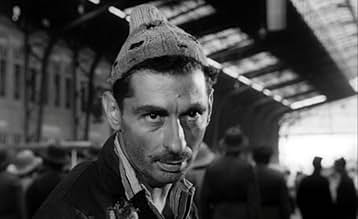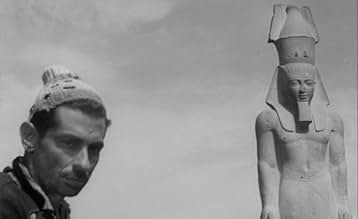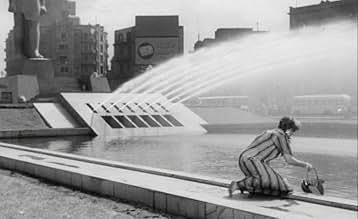IMDb रेटिंग
7.5/10
5.8 हज़ार
आपकी रेटिंग
अपनी भाषा में प्लॉट जोड़ेंA newspaper salesman at the train station in Cairo develops an unhealthy obsession with a woman who sells refreshments.A newspaper salesman at the train station in Cairo develops an unhealthy obsession with a woman who sells refreshments.A newspaper salesman at the train station in Cairo develops an unhealthy obsession with a woman who sells refreshments.
- निर्देशक
- लेखक
- स्टार
- पुरस्कार
- कुल 1 नामांकन
Hind Rostom
- Hannumah
- (as Hind Rustum)
Abdel Ghani El Nagdi
- Rural traveler
- (as Abdel Ghani Nagdi)
फ़ीचर्ड समीक्षाएं
Egypt's official entry for 'Best Foreign Language Film' at the 31st Academy awards, Cairo Station is director Youssef Chahine's paean to the city he was born in and which influenced much of his later work. Reviled in Egypt by critics and moviegoers alike on its release, the film is now considered among the finest works of its kind. With touches of Hitchcock and Powell, the film tells the story of a crippled news vendor (played by Chahine himself) who is besotted with a beautiful and capricious seller of cold drinks (Hind Rustom). This unhealthy obsession, bordering on the homicidal, leads to a tragic denouement.
This misplaced love story, if it can be called that, is played out against the backdrop of the main train station at Cairo. Indeed, more than the players, the station is the focal point of interest of the movie. A cesspool of unceasing human activity, with its fights, petty intrigues, welcomes and tear-stained farewells, the station is the throbbing heart of this vast metropolis which combines comedy and tragedy in equal measure in the stories its citizens live to narrate.
I don't really agree with certain circles who claim Cairo Station "one of the greatest films ever made" but it's a neat little film. It has that very basic, almost primitive, shooting style and editing which in some ways reminds of me Greek romance melodramas from the same time yet the perverse content sets it worlds apart from that kind of populist cinema which I suspect was as popular with lower/middle-class audiences in Egypt as it was in Greece. I liked that Chahine makes the titular railway station a stage for contrast between the old and the new. Between fashionable swinging Egyptians and the traditional Muslim conservatives. Between a lady president dressed in a modern pantsuit and destitute girls selling soda to the passengers. Between the old feudal faction of porters and the new one trying to assert its working rights by forming a union. This sociopolitical contrast touching on contemporary changes in Egyptian society (which, other than what the movie presents, I know nothing about but seem to be almost identical with the anxieties that surfaced in Greek screwball comedies of the same time) reflected in the movie itself, out of a typical melodrama of thwarted love Chahine dragging a dark noirish thriller with psychosexual undertones and an almost slasher-like turn in the third act replete with knife-wielding crazies chasing beautiful women that predates Psycho by a good two years. In borrowing the generic aspects of a programme picture for his character-driven piece and portraying his mentally imbalanced protagonist with sympathy and humanity, Chahine made a movie more wholesome than its 73 minute duration would suggest.
This Egyptian movie is a miracle in itself.It can appeal to anyone in the world and is as good as any great work of any country.All takes place in a station with a frustrated paper boy,living his life vicariously through pin ups photographs ,the central character .Round him, lots of secondary characters revolve .He seems an outcast ,without any friend,and despised by all the girls around.The work sometimes recalls Jean Renoir's "La Bete Humaine" ,but with more attention to detail.This is a microcosm which the director films with virtuosity (the editing is stunning ) and his story has a ring of sincerity.Chahine once told he put a lot of himself in his pitiful hero.
The movie does not fall easily into a genre:it is a documentary about a station with street hawkers -Hanuma almost got run over while trying to escape from the Police;it is also a political movie ,some of the workers feeling they need an union;it's also a sentimental movie ,a young couple about to be parted -strangely the young girl reappears at the very end of the movie ;it's a thriller ,the scenes in the warehouse compares favorably with Hitchcock and all best film noir directors ;it's finally a movie which almost verges on fantasy and horror ,with a final as impressive as those of "sunset boulevard" or "whatever happened to Baby Jane?"
There's even an embryonic woman's lib! Let's underline the importance of the wide screen ,which makes the director look like an entomologist watching an ant hill with a magnifying glass:"Bab El Hadid" ,it's all this and more.
The movie does not fall easily into a genre:it is a documentary about a station with street hawkers -Hanuma almost got run over while trying to escape from the Police;it is also a political movie ,some of the workers feeling they need an union;it's also a sentimental movie ,a young couple about to be parted -strangely the young girl reappears at the very end of the movie ;it's a thriller ,the scenes in the warehouse compares favorably with Hitchcock and all best film noir directors ;it's finally a movie which almost verges on fantasy and horror ,with a final as impressive as those of "sunset boulevard" or "whatever happened to Baby Jane?"
There's even an embryonic woman's lib! Let's underline the importance of the wide screen ,which makes the director look like an entomologist watching an ant hill with a magnifying glass:"Bab El Hadid" ,it's all this and more.
It's not hard to see why "Cairo Station" was banned for 20 years in Egypt. It gained much recognition in Berlin, being nominated for the Golden Bear and Chahine missing out on the Best Actor prize on a technicality, but in Egypt the audiences, used mostly to the romantic comedies and melodramas Egypt's massive film industry was expected to release, found the film's darkly sexual nature disturbing, and the censors reacted in an even harsher manner. Expectations for the film were probably even further away from the finished product since the film starred Farid Shawqi and Hind Rostom, two big stars of the Egyptian cinema.
Everything you hear about the film from Chahine and from Egyptian film scholars suggest that he put his heart and soul into making this film. If the gritty yet stunningly well-orchestrated visuals don't convince you that's true, then Chahine's passionate, masterful portrayal of the main character surely will. It really is one of the greatest performances of all time, and that's fairly surprising coming from someone who chose to stay behind the camera for most of his long career. There's not a single moment where you don't completely believe the character and the character's motivations and feelings, Chahine is just THAT good.
The storyline itself is nothing to write home about unless you view it within the context of Egypt when the film was released. The film is very reflective of the pent-up frustration that many Egyptians felt (one could even say that inner turmoil of the main character is completely intended as a reflection of Egypt before Nasser took over), and the events surrounding the main plot are hugely reflective of the transition Egypt was going through (in one spectacularly stylized scene Qinawi looks on as rock n' roll is celebrated Egyptian-style inside a train carriage).
There are some brilliant moments throughout the film, but Chahine's handling of the final twenty-odd minutes are beyond brilliant. For one, he handles the change of tone spectacularly well, and his performance certain helps here. It's remarkable to watch a film directed by its star in which the actor's performance and the director's work feel so intrinsically connected- when Chahine the actor is dancing to rock and roll, Chahine the director is wonderfully playful, allowing the camera to move freely and capture the energy and enthusiasm of the scene. When Chahine the actor is at his most vulnerable and sexually obsessive Chahine works the film into a tense, spectacularly well-edited frenzy.
This isn't Chahine's first film, but it is quite possibly Chahine the auteur's first film. Although it contains a fair bit of Lang and a little Hitchcock (it is remarkably similar in its final stages to Hitchcock's "Psycho", which would only come out two years later, even some of the editing is similar), the film is mostly Chahine, looking at Egypt as only he can. "Cairo Station" is a film of remarkable depth, filled with great characters and wonderful performances, and featuring a spectacularly tense score. Beyond all that it is a film of immense technical precision and of unparalleled passion, and it is unquestionably the work of a master. A perfect film, the greatest Arabic-language film ever made, and one that I would personally rank as one of the greatest films made anywhere by anyone.
10/10
Everything you hear about the film from Chahine and from Egyptian film scholars suggest that he put his heart and soul into making this film. If the gritty yet stunningly well-orchestrated visuals don't convince you that's true, then Chahine's passionate, masterful portrayal of the main character surely will. It really is one of the greatest performances of all time, and that's fairly surprising coming from someone who chose to stay behind the camera for most of his long career. There's not a single moment where you don't completely believe the character and the character's motivations and feelings, Chahine is just THAT good.
The storyline itself is nothing to write home about unless you view it within the context of Egypt when the film was released. The film is very reflective of the pent-up frustration that many Egyptians felt (one could even say that inner turmoil of the main character is completely intended as a reflection of Egypt before Nasser took over), and the events surrounding the main plot are hugely reflective of the transition Egypt was going through (in one spectacularly stylized scene Qinawi looks on as rock n' roll is celebrated Egyptian-style inside a train carriage).
There are some brilliant moments throughout the film, but Chahine's handling of the final twenty-odd minutes are beyond brilliant. For one, he handles the change of tone spectacularly well, and his performance certain helps here. It's remarkable to watch a film directed by its star in which the actor's performance and the director's work feel so intrinsically connected- when Chahine the actor is dancing to rock and roll, Chahine the director is wonderfully playful, allowing the camera to move freely and capture the energy and enthusiasm of the scene. When Chahine the actor is at his most vulnerable and sexually obsessive Chahine works the film into a tense, spectacularly well-edited frenzy.
This isn't Chahine's first film, but it is quite possibly Chahine the auteur's first film. Although it contains a fair bit of Lang and a little Hitchcock (it is remarkably similar in its final stages to Hitchcock's "Psycho", which would only come out two years later, even some of the editing is similar), the film is mostly Chahine, looking at Egypt as only he can. "Cairo Station" is a film of remarkable depth, filled with great characters and wonderful performances, and featuring a spectacularly tense score. Beyond all that it is a film of immense technical precision and of unparalleled passion, and it is unquestionably the work of a master. A perfect film, the greatest Arabic-language film ever made, and one that I would personally rank as one of the greatest films made anywhere by anyone.
10/10
"Cairo Station" is a very sad film...there's no getting around that. The story is tragic and when the film ends, you'll likely feel a bit drained...so don't day I didn't warn you. But I am not saying to avoid this Egyptian flick...it's well worth seeing.
The story begins with Madbouli introducing the film and explaining how me met and befriended Qinawi*. Qinawi was a poor guy with a limp without a friend in the world...so he adopted him and helped set him up at the train station selling newspapers. What follows for much of the film is showing the plight of all the many workers at the station-- the porters, women who work there illegally selling drinks and the rest. They get paid next to nothing and life is very, very hard.
About midway through the story, Qinawi approaches Hanouma and proposes to her. But he's poor, limps and seems a bit slow intellectually...and Hanouma is an obnoxious pig. So she laughs at him and belittles him for proposing to her! Qinawi is crushed...and soon has murder on his mind. Here is where it gets interesting because although everyone watching the picture knows murder is wrong, within many or perhaps most watching the film, there is a part of them that wants to see the coarse and horrid Hanouma die! This reminds me of the great 1944 film, "The Suspect"...where the audience naturally cheers for the leading man to kill and hopes he gets away with it!! I don't want to say more...other than the plan does NOT go as Qinawi hoped...and ends on a very sad note.
The film has a good story but there are other interesting things going for it. The camera-work is pretty amazing...especially coming from a nation not known for filmmaking. Many of the scenes have an almost film noir style to them with the lighting and camera angles. And, the film is rather daring--especially choosing to make the movie about folks near the bottom of society. Worth seeing.
*Like many films not in English and from countries with non-Western alphabets, there is no one way to spell the characters' names. The subtitles call him Qinawi and IMDb Kinawi...both are correct.
The story begins with Madbouli introducing the film and explaining how me met and befriended Qinawi*. Qinawi was a poor guy with a limp without a friend in the world...so he adopted him and helped set him up at the train station selling newspapers. What follows for much of the film is showing the plight of all the many workers at the station-- the porters, women who work there illegally selling drinks and the rest. They get paid next to nothing and life is very, very hard.
About midway through the story, Qinawi approaches Hanouma and proposes to her. But he's poor, limps and seems a bit slow intellectually...and Hanouma is an obnoxious pig. So she laughs at him and belittles him for proposing to her! Qinawi is crushed...and soon has murder on his mind. Here is where it gets interesting because although everyone watching the picture knows murder is wrong, within many or perhaps most watching the film, there is a part of them that wants to see the coarse and horrid Hanouma die! This reminds me of the great 1944 film, "The Suspect"...where the audience naturally cheers for the leading man to kill and hopes he gets away with it!! I don't want to say more...other than the plan does NOT go as Qinawi hoped...and ends on a very sad note.
The film has a good story but there are other interesting things going for it. The camera-work is pretty amazing...especially coming from a nation not known for filmmaking. Many of the scenes have an almost film noir style to them with the lighting and camera angles. And, the film is rather daring--especially choosing to make the movie about folks near the bottom of society. Worth seeing.
*Like many films not in English and from countries with non-Western alphabets, there is no one way to spell the characters' names. The subtitles call him Qinawi and IMDb Kinawi...both are correct.
क्या आपको पता है
- ट्रिवियाOfficial submission of Egypt for the 'Best Foreign Language Film' category of the 31st Academy Awards in 1959.
- कनेक्शनFeatured in Caméra arabe (1987)
टॉप पसंद
रेटिंग देने के लिए साइन-इन करें और वैयक्तिकृत सुझावों के लिए वॉचलिस्ट करें
- How long is Cairo Station?Alexa द्वारा संचालित
विवरण
- चलने की अवधि
- 1 घं 17 मि(77 min)
- रंग
- ध्वनि मिश्रण
- पक्ष अनुपात
- 1.37 : 1
इस पेज में योगदान दें
किसी बदलाव का सुझाव दें या अनुपलब्ध कॉन्टेंट जोड़ें






















